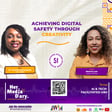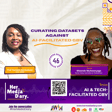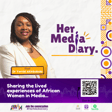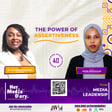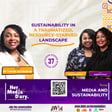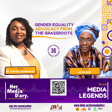
Her Media Diary Episode 15: "Know when it's time to check out" with Verah Okeyo
Verah Okeyo is an award-winning journalist, communications manager, and media trainer with over ten years of experience covering global health with a focus on maternal and child health, infectious diseases, and underrepresented communities.
In this episode, Verah shares her journey from her childhood to the newsroom while battling with clinical depression. She shares the strategies she developed to manage her mental health and how her lived experiences have helped shape a set of values that guides how she reports the stories of others.
Verah’s story embodies strength, survival, and courage. She calls on journalists and media practitioners to first know when it’s time to check out and, secondly, to show empathy when writing stories of victims and survivors, even if they fall outside the box of our notions of who a perfect victim should be.
Subscribe to Her Media Diary now on your favourite podcasting platform https://linktr.ee/hermediadiary
Learn about African Women in Media https://africanwomeninmedia.com
List of organisations for support with your mental health
Africa mental health research and training foundation
National Institute of Mental Health
